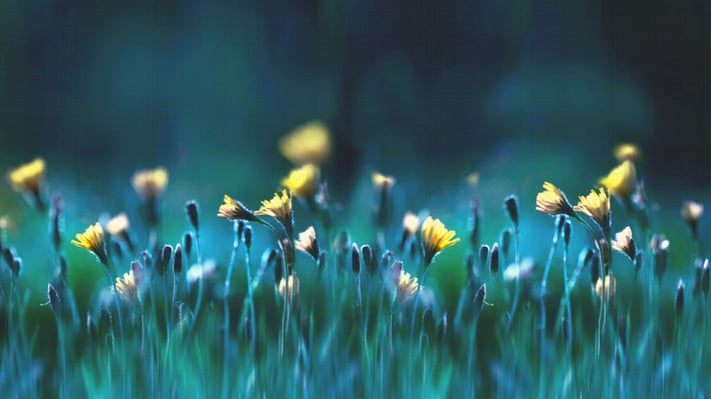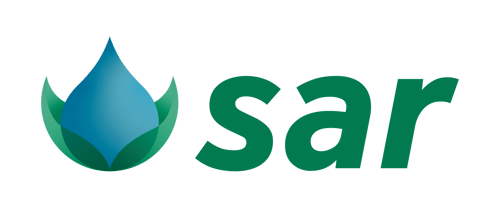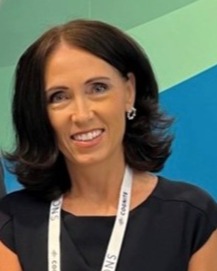You have been in SAR for 20 years, what do you like the most about your job?
It's a fast-paced development, new things come up week by week. It can be academic, as well as collegial and social. SAR has given me the opportunity to work with a lot of different things, and I have never gotten bored. It is exciting professionally, and things are constantly appearing that make sense for the conservation of nature and a greener and more sustainable future.
Opportunities and valuable work = well-being
It is typical at SAR that if you want to contribute in a special area, you will be able to contribute there. Those who want to develop and grow within a field will get that opportunity. It is the main reason why I have stayed for 20 years. Over the years we have grown and become many employees, but at the same time safeguarded our identity throughout these years. You know everyone, especially when you've been there as long as I have. The job makes sense to me, and that means a lot. I believe that the work I do is important, and for me it is a key factor in well-being.
Tell us about how you started your career in SAR
I have worked at SAR since 2003. I began my working career in 2000 after completing my education in chemistry and microbiology at the Norwegian University of Agriculture in Ås. After my studies, I worked in a laboratory for JordForsk for approx. 1 year, before I was brought to DeconTerra, a company that did soil cleaning. There I worked with, among other things, cleaning soil in areas used for industry and new construction projects. Even back then, we were keen to reuse as much of the pulp as possible and were up to a utilization rate of 80%.
In 2003, the company went bankrupt, and when SAR bought up the bankruptcy estate of equipment, I was one of the three employees who followed the equipment to Stavanger. There, the same activities continued as before but now for SAR. Since 2005 I have lived in Sandnes and enjoy being close to everything Norway has to offer of its nature.
How would you describe your journey in SAR
The rules of the game and forms of communication at the time
At the beginning I functioned like a project engineer, as a support for equipment and chemistry used in the processes. SAR was a different company at the time. We were a small group that carried out tasks on a project basis, and the rules of the game were different than today. Communication was different, as the internet and smartphones were not particularly widespread. There was less interdisciplinary collaboration and communication.
The establishment of SAR's first treatment facility
In the early years I was involved in a number of projects, but in 2005-2006 I was able to help establish SAR's first waste treatment plant. Before this, we mainly collected waste which was then transported to other facilities.
We started with a thermal plant for the treatment of drill cuttings and slop at Averøy, outside Kristiansund. At the same time, the way of working changed from project-based work to becoming an own department in SAR. When we got started at Averøy, I remember that we felt a different sense of belonging to SAR.
The start of a new and greener treatment process for drill kuttings and slop
At Averøy, water and oil were 'steamed' from the drill cuttings through a process called 'Thermal Desorption Units' (TDU). It started with an American 'Unit', for which it was very difficult to get spare parts, and after a short time it was changed to another type of plant from Canada. We again encountered challenges with the chemicals used there, and we finally ended up developing a new, greener process, which was better suited to SAR's vision and needs.
In 2011, SAR decided to switch to TCC® (Thermo Mechanical Cutting Cleaner) technology, which we still use today. It was incredibly exciting to be able to test out a new Norwegian technology on such a scale. Furthermore, I helped develop a biological water treatment plant for the treatment of oil-contaminated water in Tananger.
Experience from work with international projects
I have also had the pleasure of taking part in a number of international initiatives and projects, including one in Kuwait. Huge amounts of oil-contaminated sand and large lakes of crude oil were to be processed there. We started a TCC treatment plant, which was operated for 5 years with good financial and environmental results. SAR actually received several awards from the Kuwait Oil Company (KOC) for the work we took part in.
|
"I believe the key to success lies in being genuinely interested in making a difference."
|
For comparison - what is a typical working day like today?
The work life today is clearly different from when I started in SAR. I now work as a Senior Technical Advisor in the sustainability department, and have several different areas of responsibility. I take part in bidding processes, documentation of technical solutions, I'm more involved in strategy and development of the company, as well as in finding solutions to complex problems. Communication at SAR has also changed. There is much more openness and interdisciplinary collaboration between the departments. Today's digital technology has made it easier to communicate and collaborate, which creates better results.
Sharing of experience and guidance
The biggest difference in the way I work is that today, I am a supervisor. Before I was involved in training and telling people to do things a certain way, but today I am a supervisor with the aim of facilitating competence enhancement across departments in SAR. We focus on teaching the subject area to the employees, instead of strict and specific instruction in work procedures and operations. We encourage a deeper holistic understanding and believe that this is the recipe for success. There is a big difference between knowing what to do versus why you do it.
What are you most proud of having taken part in during these years at SAR?
Proud to contribute to positive change
It seems that communication and collaboration have become increasingly important in waste management, and there has been a change from the traditional 'out of sight, out of mind' mentality. It helps to communicate. I am proud to be able to take part in reversing this way of thinking. It helps to talk with each other and share knowledge and information to improve waste management - and to create value from the waste.
I am most proud of having had a voice, even though I am not on any board or management. To have been taken into account and given feedback that I have been an important part of the development is a valuable feeling. To be part of the company's journey and to be able to contribute to positive change.
|
"'Work for increased sustainability makes sense'"
|
What changes would you say have taken place in relation to sustainability and the environment during all these years?
HSE and sustainability have not always had as much focus as they do today. There was simply not enough good information available. There was a general lack of understanding in the industry as to why this was important. The environmental authorities also did not show how to deal with new technology, which led to the framework not being fully in place. It was often left more open for institutions to do what they thought was best, which, despite good intentions, was not always optimal.
I experience SAR as a serious and responsible actor in the waste industry
I myself have experienced that we at SAR have always followed all guidelines and procedures set by the government and authorities. At the same time, over the years, there has been great development around, among other things, the degree of cleaning and protection of the environment and employees.
I see a positive change throughout the industry around waste management. There is an active restructuring with greener operations across industries. We always try to create good, sustainable solutions for waste management. The EU directives make it even easier to achieve efficient and safe handling of waste. In previous years, there has been little to no regulation, which has led to more pollution, and the loss of large values. Willingness and understanding have increased greatly in the last 5-10 years, and I believe that for most people seeing the values in waste will gradually become part of the norm.
SAR has the experience and expertise to play an important role in the industry
I look positively on the development and look forward to the future. There is an increased awareness of waste management, and a clear set of regulations. This has led to the industry now taking us seriously. We are part of the Norwegian Association for Hazardous Waste (NFFA) and active in a number of other professional fields who are interested in hearing about our experiences. This shows that our knowledge and experience are valuable and that we have an important role to play in the development of the industry.

What do you think will shape the future within your professional field?
I believe that cooperation and understanding of the importance of the environment will increase more and more among most people. This will lead to a more symbiotic development towards a sustainable existence, both for humans and animals.
Cooperation is key to a greener future
We will see new forms of collaboration between different industries and professional fields. Although I already work a lot with the oil industry, I believe that there will be even closer ties and cooperation with farming, industry and agriculture in the long term. It is important that we understand each other, so that we can better exchange knowledge and experiences. I hope that there will be an open and transparent arena between these fields, so that those who can contribute are allowed to contribute. We have only just begun this journey.
One challenge will be to avoid greenwashing in reporting. Both SAR and the industry need to be honest with ourselves about what different factions are. It can sometimes be difficult to be honest and direct, but it is necessary to achieve our goals.
Do you have any good advice to give to students, apprentices and potential job seekers who wish to work in your field?
I feel lucky to have had a trainee, and to have been able to be a mentor to him. I found it motivating to have someone to guide and really had to sharpen my head to be able to give him relevant and meaningful tasks.
Professional field with exciting opportunities for those who have a passion for the environment and sustainability
New graduates who are genuinely interested in the field will have many opportunities to find success, as there are many challenges that must be solved in the years ahead. In order to find innovative solutions to these challenges, it is important to be curious and hungry for knowledge and to be willing to adopt new technologies and concepts.
Within waste management, you will learn about an incredible number of issues and technologies. It's exciting and fun. The possibilities are many. You will be allowed to take part in a journey that is constantly changing, and that works to create value from waste.
I believe the key to success lies in being genuinely interested in making a difference.


-weboptimert.jpg?width=1200&height=600&name=Profilbilde-Frank-(Featured-i-saken)-weboptimert.jpg)


